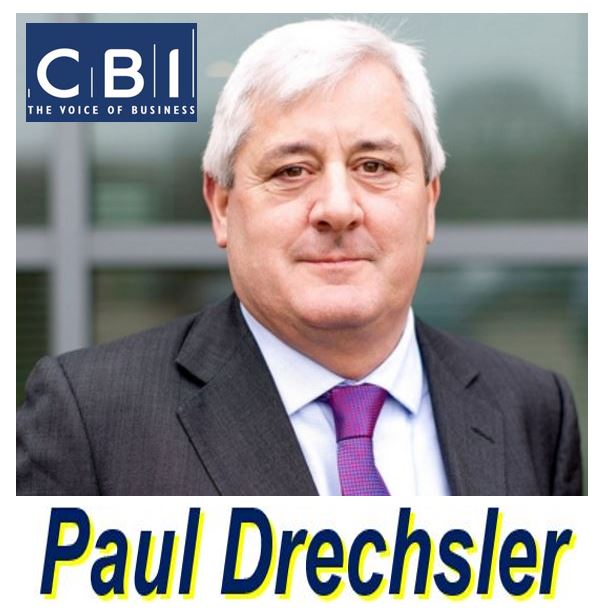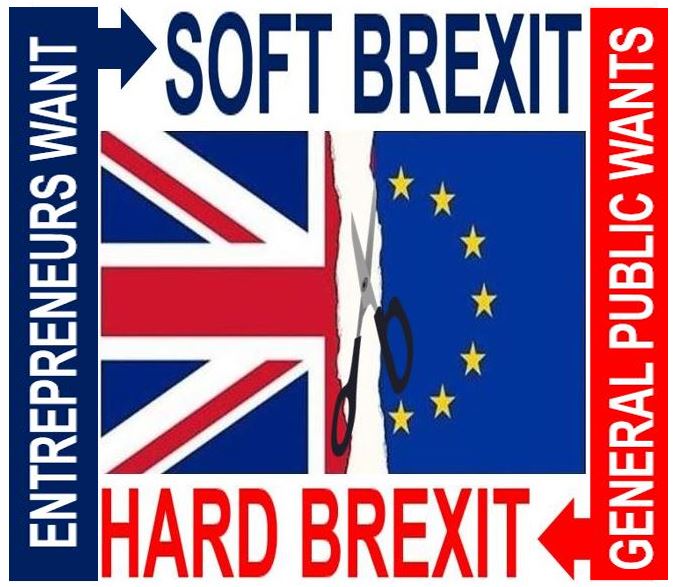CBI President Paul Drechsler will tell the Government that British businesses are 100% committed to a successful Brexit – Britain Exiting the European Union. The UK business organization, which claims to speak for over 190,000 commercial enterprises, would like to help the Government ensure a smooth separation from the EU in two years’ time. CBI stands for Confederation of British Industry.
In a speech he will deliver to over one thousand business leaders at the Grosvenor House Hotel in London on Monday, Mr. Drechsler will call on the British Government to build on the certainty it has provided to the economy, by implementing transitional arrangements as soon as the country leaves the European Union in 2019.
The vast majority of businesses in the UK act as a force for good, he will say. But he will also add that the ‘unacceptable transgressions’ of a very small minority, which have many Britons questioning the value of business as a whole, must be addressed, and that businesses themselves should take the lead.
 Paul Drechsler has been CBI President since June 2015. He has been a CBI Board member since 2012. He was Chairman of the CBI Energy Policy Committee from 2007 to 2012, as well as member of the Chairmen’s Committee. In 2015, he received an Honorary CBE for services to the construction industry. He is chairman of Liverpool-based Bibby Group. He was born in Ireland, studied Engineering Science at the University of Dublin, Trinity College, where he graduated with honours. He is married with three children.(Image: Confederation of British Industry)
Paul Drechsler has been CBI President since June 2015. He has been a CBI Board member since 2012. He was Chairman of the CBI Energy Policy Committee from 2007 to 2012, as well as member of the Chairmen’s Committee. In 2015, he received an Honorary CBE for services to the construction industry. He is chairman of Liverpool-based Bibby Group. He was born in Ireland, studied Engineering Science at the University of Dublin, Trinity College, where he graduated with honours. He is married with three children.(Image: Confederation of British Industry)
CBI members making the best of Brexit
Regarding the commitment of businesses to make the best of Brexit, the CBI President will say:
“The firms I speak to every day are 100% committed to making the best of Brexit. To do this, government and business must do more than just work together. We must be two partners with a common cause.”
“Two signatories to the same contract, securing the best possible result for the British people. On Brexit, business has a responsibility to be part of the solution. I’d like to thank every person in this room for how you’ve led your businesses since 23rd June.”
“When times were tough you remained optimistic and mindful of economic stability. That deserves recognition. We need to remain calm, confident and constructive.”
 CBI members want a Soft Brexit – unfettered access to the EU market, maintain passporting rights, and for the UK to continue as a member of the Customs Union. In order to get all that, they must accept the free movement of EU citizens. Most non-business Britons would like a Hard Brexit, i.e. total separation with complete control over immigration numbers, even if that means losing privileged access to the EU market.
CBI members want a Soft Brexit – unfettered access to the EU market, maintain passporting rights, and for the UK to continue as a member of the Customs Union. In order to get all that, they must accept the free movement of EU citizens. Most non-business Britons would like a Hard Brexit, i.e. total separation with complete control over immigration numbers, even if that means losing privileged access to the EU market.
CBI says uncertainty bad for business
It is crucial that the current and future economic uncertainty be mitigated, Mr. Drechsler added. He believes that when it comes to negotiation, businesses understand only too well the need for discretion.
The CBI and its members are not asking the Government for a ‘running commentary’ on how the negotiations are going and how it plans to play its cards. What British businesses want is clarity, and “above all – a plan.”
Mr. Drechsler added:
“We’ve seen encouraging signs. The Government has set a deadline for triggering Article 50. It’s given guarantees on EU funding programmes that have already been allocated. And it’s offset uncertainty around Brexit with greater certainty on Heathrow and Hinkley Point.”
However, the CBI says that in other areas there is a great deal of uncertainty. British companies need to know that the Government does not plan to close the country’s borders to Europe’s talents. Those negotiating on the country’s behalf need to make sure that unfettered access to the EU market is not lost.
When Brexit clock strikes midnight?
There is another important question that every British company that imports or exports goods is asking: “What happens on the day after Brexit – when the clock strikes midnight, and our two years’ negotiating time is up?”
Companies today are inevitably imagining the prospect of a cliff edge scenario – a sudden transformation in trading conditions. This change could come about overnight.
Even if Britain’s legal obligations are clear and in place, there would still be some major practical hurdles to overcome.
Mr. Drechsler explained:
“Our ports, airports and logistics firms, if faced with new trading rules, could suddenly need new and potentially complex paperwork, which would take more time and money to process. As a result, they’d need more warehouses to store more goods on-site, and more supply roads for the vehicles waiting to deliver them.”
“At short notice – this would be impossible. So – for many firms it’s not about a ‘hard’ or ‘soft’ Brexit, but a ‘smooth’ Brexit, which avoids these cliff edge problems.”
CBI says UK needs a smooth transition
Prime Minister Theresa May and her Government should build on the positive moves they have already made to quell uncertainty by drawing up plans for a seamless transition, giving companies both the time to adapt to the new rules and regulations, and the confidence to carry on investing after 2019, Mr. Drechsler commented.
The CBI believes that too many Britons see business as something alien – something they do not belong to, run by a priveleged few who look and sound very different to them, and who seem to live by their own code of ethics and play by another set of rules.
There have been some unacceptable transgressions, Mr. Drechsler admitted, which have made many people question the value of what the business community does. And the right of business people to do it.
Regarding these transgressor, Mr. Drechsler said:
“These cases are exceptions, but they’re shaping people’s view of all of us. On a range of issues – we need to show not just that we’re listening to people’s concerns, but that we’re acting on them. Firms should explain – in public – what steps they’ve taken on employee engagement and representation.”
It is important that Britain’s business community sends out a clear message that rewarding failure is never an option. Exceptional pay can only be the reward for exceptional performance.
The CBI urges the Government to introduce a binding vote on executive pay for ‘repeat offenders’ who just keep failing, to satisfy stockholders with their pay decisions.
Regarding where businesses stand, Mr. Drechsler said:
“We need to show people that business is on your side. Firms of all sizes are providing opportunities for people across the UK. Big firms alone employ more than 10 million people – the same as the entire population of Portugal! And we’re on people’s side on education.”
In twenty years’ time, when people look back to this period, what will they say about UK businesses? Will they praise them for having held their nerve and kept on going, pushing for the best Brexit deal, or criticise them for surrendering to a ‘wait and see’ mentality, Mr. Drechsler wonders.
Video – CBI was very anti Brexit
During the months leading up to the In-Out EU Referendum in the UK on 23rd June, 2016, the CBI was on the side of the ‘Remain’ camp. It said Brexit would cost the UK 5% of annual GDP by 2020, and nearly one million jobs. The ‘Leave’ camp accused the CBI of scaremongering.
